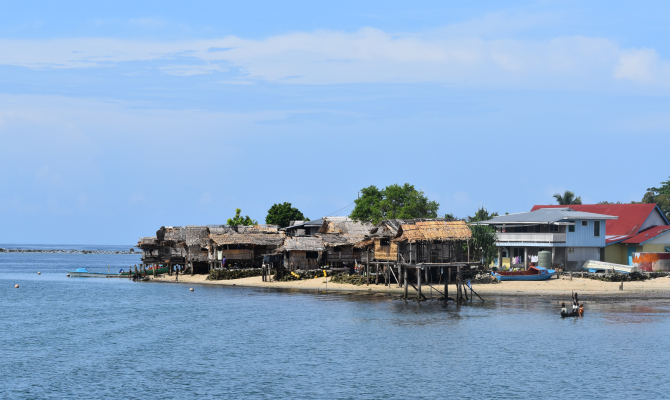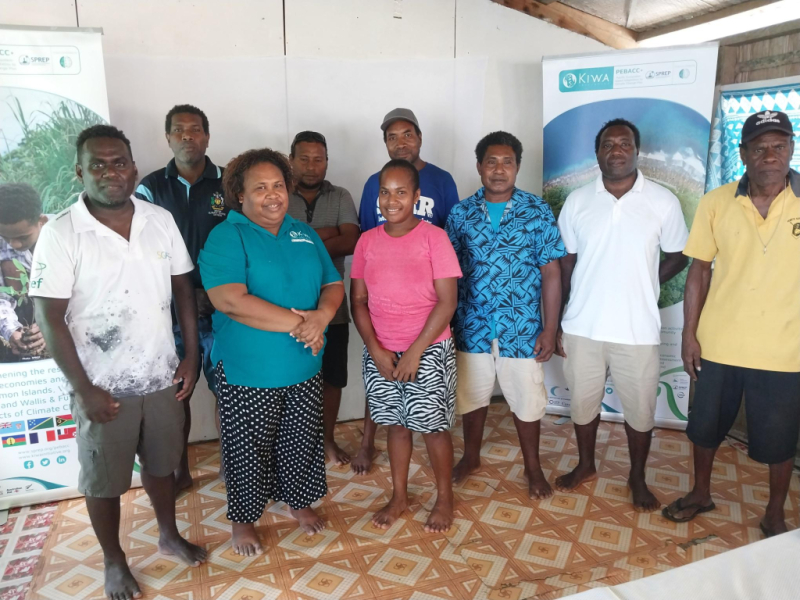
South Malaita, Solomon Islands – In a decisive step toward building climate resilience at the grassroots level, the Pacific Ecosystem-based Adaptation to Climate Change (PEBACC+) project and the UNDP’s Small Grants Programme (SGP) joined forces to conduct a week-long training to equip local participants with practical skills in concept note and proposal development for climate adaptation projects in Afio, South Malaita.
The PEBACC+ project is implemented by the Secretariat of the Pacific Regional Environment Programme and funded by the Kiwa Initiative and the French Facility for Global Environment.
Held from 2nd to 7th April 2025, the training brought together 10 participants – seven men and three women – from key watershed and coastal communities including Tapaatewa, Eliote, Oriore, and Waitoto, as well as representatives from the Apunepara Haamwaora Natural Resources Association (AHNRA) community-based organization. The participants were chiefs, community leaders, church leaders, schoolteachers, and youth leaders. The goal was to build capacity in accessing funds for Nature-based Solutions (NbS) and Ecosystem-based Adaptation (EbA) initiatives.
“This kind of training empowers communities to take the lead in developing their solutions to climate challenges,” said Mr. Teiba Mamu, SGP National Coordinator, United Nations Development Programme (UNDP). “Proposal writing is a critical tool for unlocking resources that support community-led sustainability and resilience.”

The workshop focused on enhancing participants’ ability to navigate the proposal processes of SGP and other in-country donors. Many rural and coastal communities face hurdles in securing resources due to limited technical skills in proposal preparation. By addressing this gap, the initiative contributes directly to building long-term resilience and sustainable development capacity.
Initial planning for the training began in February 2025, underscoring strong interagency coordination and the shared vision of advancing locally driven environmental action.
“This training represents a critical step in empowering our local communities to take charge of their development pathways,” said Ms. Joanne Aihunu, PEBACC+ Country Coordinator, SPREP.
“The enthusiasm and commitment demonstrated by the participants reflect the growing recognition that sustainable, community-driven solutions are at the heart of resilience. PEBACC+ is proud to work alongside UNDP’s SGP and our national partners to ensure that local voices are heard and supported through practical, hands-on capacity development like this," she added.

Gibson, a participant from the Eliote community shared that the training helped him better understand the SGP process, enabling him to support his community-based organisation in applying for funding from SGP Solomon Islands.
As a direct outcome of the workshop, two project concepts developed by participants will now undergo mentoring support to refine their proposals. The next steps will focus on guiding these communities through the submission process to ensure both proposals are accepted for funding under the SGP Solomon Islands programme.
The workshop was supported by the Ministry of Environment, Climate Change, Disaster Management and Meteorology, and aligns with SPREP’s goals through the PEBACC+ of strengthening local institutions and communities across the Pacific to implement EbA strategies.
PEBACC+ is a regional project implemented by SPREP and funded by the Kiwa Initiative through its donors the European Union, Agence Française de Développement (AFD), Global Affairs Canada, Australian Government Department of Foreign Affairs and Trade (DFAT) and New Zealand Ministry of Foreign Affairs and Trade (MFAT), with co-financing from French Facility for Global Environment (FFEM). This four-year project seeks to strengthen the resilience of ecosystems, economies, and communities to the impacts of climate change in Fiji, New Caledonia, Wallis and Futuna, Solomon Islands and Vanuatu. The project will develop, sustain, and institutionalize Ecosystem-based Adaptation to climate change in these five countries and territories.
For more information, please contact: Setaita Tavanabola, Communications Officer, PEBACC+ Project, SPREP; email: [email protected] or visit www.sprep.org/pebacc-plus